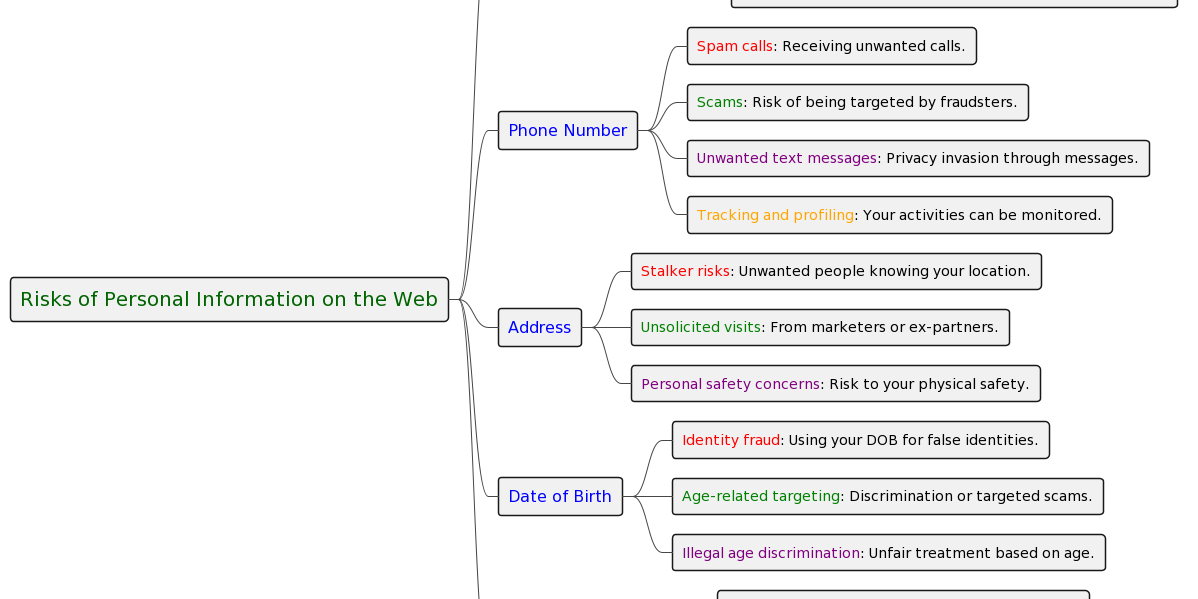Risks of Personal Information on the Web
The modern web is a sprawling network of connectivity and information sharing, which, while being a marvel of the digital age, also opens up various avenues for privacy invasion and personal security concerns. As we increasingly live out parts of our lives online, it’s critical to understand the risks associated with personal information available on the web. This article delves into the potential dangers and offers insights into keeping your digital persona secure.
First and Last Name
When your full name is accessible online, it paves the way for identity theft, where malicious actors can use your name for fraudulent activities. This risk extends to impersonation as well, where individuals could pretend to be you for malicious purposes. Beyond these, your name can also be used in various fraudulent activities, from financial fraud to creating fake profiles that can damage your reputation.
Phone Number
A phone number might seem innocuous to share, but it can lead to spam calls and scams. Fraudsters can target you for elaborate phone scams or phishing attempts. Moreover, your phone number can be used to track down additional personal information. Privacy invasion through unwanted text messages is another concern, where your peace can be disrupted by marketers or malicious actors.
Address
Publishing your address online can lead to stalker risks, where unwanted individuals, ranging from obsessive strangers to potential harassers, might find out where you live. It also opens up the possibility of unsolicited visits, whether by marketers, ex-partners, or other unwelcome guests. More alarmingly, this could lead to personal safety concerns, where your physical safety is at risk.
Date of Birth
Your date of birth is a key identifier that, in the wrong hands, can lead to identity fraud. It’s often used to verify identity, and having it exposed can allow fraudsters to impersonate you. Age-related targeting can also be a concern, where you could be discriminated against or targeted for scams designed to exploit specific age groups. Additionally, the exposure of one’s date of birth can lead to illegal age discrimination.
Salary Information
While discussing salaries is becoming less of a taboo, publishing this information online can have significant repercussions. Financial fraud is a primary risk, as scammers could use your salary details to tailor their schemes to your perceived financial capacity. Unwanted sales pitches are also a concern, where salespeople target you based on your income, not to mention the economic profiling that can lead to judgment or treatment based on your income level.
Mitigation Strategies
To protect your digital identity, it’s imperative to manage your online footprint judiciously. Start by limiting the amount of personal information you share on social media and other online platforms. Regularly monitor your online presence to ensure that no sensitive personal information is publicly available.
Consider employing services like Wiperts.com that specialize in protecting personal information online. Our services can help in removing your personal details from the web and continuously monitor the internet to ensure that your information doesn’t reappear.
Be cautious with whom you share personal details, even on seemingly secure platforms. Opt for privacy-focused communication tools and services that offer strong encryption to keep your conversations secure.
Educate yourself on the various scams and fraudulent activities that leverage personal information. This knowledge can be your first line of defense against potential threats.
Finally, advocate for stronger data protection laws and support organizations that fight for digital privacy rights. As individuals become more aware and engaged in the fight for digital privacy, the safer our personal information will be online.
Conclusion
In the interconnected realm of the web, personal information is as vulnerable as it is valuable. By understanding the risks associated with the exposure of personal data and taking proactive measures to safeguard it, we can navigate the digital world with confidence and security. It’s not just about protecting data — it’s about preserving our digital autonomy and ensuring that our online lives remain under our control.








